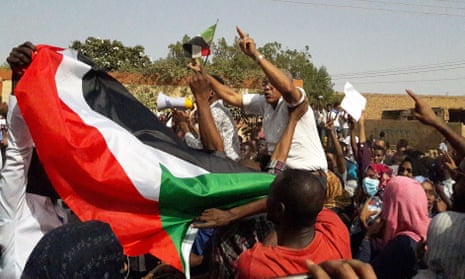We are writing to raise serious concerns following violent attacks on peaceful protesters by the government of Sudan (Report, 18 January). Dozens of protesters have been killed by security forces in an attempt to suppress the protests, and the government’s response appears to be escalating. There have been disturbing reports of security forces firing bullets and teargas into hospitals, which for many observers is troublingly reminiscent of atrocities committed by the regime in Darfur, Blue Nile and South Kordofan.
Protesters come from all parts of Sudanese society and are united in the call for the resignation of President Omar al-Bashir and key members of his government. We unreservedly condemn the government of Sudan’s disproportionate and deadly response to peaceful protest by tens of thousands of Sudanese people. The government of Sudan must now engage constructively with the legitimate grievances raised by demonstrators across the country.
The UK must be steadfast in its demand for a cessation of violence and the release of political prisoners. We call on the UK government to do everything it can to pressure the government of Sudan to respect the freedoms of assembly, expression and association as laid out in Sudanese and international human rights law, and ensure any investigation into the killing of significant numbers of unarmed protesters is independent and credible.
We look forward to hearing the actions the foreign secretary will take to ensure that the human rights of protesters will be respected, particularly what specific requirements the UK government will place on the government of Sudan, and what effect Sudan’s response to these protests will have on UK-Sudan strategic dialogue.
Bellingham MP Chair, All party parliamentary group for Sudan and South Sudan
David Drew MP Vice-Chair, APPG Sudan and South Sudan
Nic Dakin MP Vice-Chair, APPG Sudan and South Sudan
Stephen Doughty MP Vice-Chair, APPG Sudan and South Sudan
David Alton Vice-Chair, APPG Sudan and South Sudan
Caroline Cox Vice-Chair, APPG Sudan and South Sudan
John Montagu Vice-Chair, APPG Sudan and South Sudan
Jo Swinson Foreign Affairs Spokesperson, Liberal Democrats
Jim Shannon MP Spokesperson for Human Rights, DUP
Ann Clwyd MP Chair, All-party parliamentary human rights group (PHRG)
Caroline Lucas MP
Christine Jardine MP
Kate Osamor MP
George Carey
Stephen Kerr MP
Nick Holtam Bishop of Salisbury
Shaista Ahmad Sheehan
Richard Harries
Sammy Wilson MP
Donald Curry
David Chidgey
Mary Goudie
Richard Burden MP
James Duddridge MP
Caroline Spelman MP
Stephen Twig MP
Mary Creagh MP
Stephen doughty MP
Patrick Grady
Missing from your coverage of the Sudan protests (Omar al-Bashir launches media crackdown as Sudan protests continue, 23 January) is the focused attacks and assault on healthcare workers. Reports suggest that hospitals have been invaded by police forces chasing peaceful protesters, with teargas and live ammunition inside an emergency department at the Omdurman hospital, and many members of the Sudan Doctors’ Union have been arrested and continue to be detained.
When the health system becomes the centre ground for conflict, it is our responsibility to use what political voice we have to call for action.
Last weekend, 200 UK health workers, alongside the Sudan Doctors’ Union UK branch, worked together to deliver a letter to the Foreign and Commonwealth Office. They urged the UK to make a diplomatic intervention and call on President Omar al-Bashir and his regime to end its brutal use of force in the face of these protests.
The history of this conflict is rooted in an ongoing dismantling of the public welfare system, including the under-funding and privatisation of public health infrastructure. It is no surprise that Sudanese health workers are at the forefront of the political organising; it is our duty to support them.
Guppi Kaur Bola
Director, Medact
Join the debate – email guardian.letters@theguardian.com
Read more Guardian letters – click here to visit gu.com/letters
